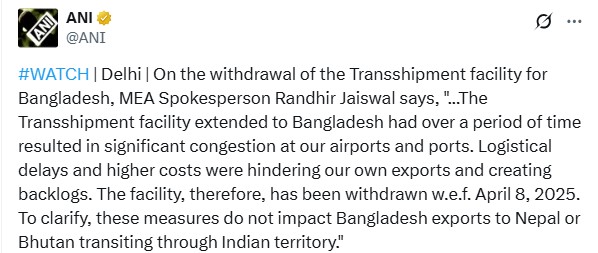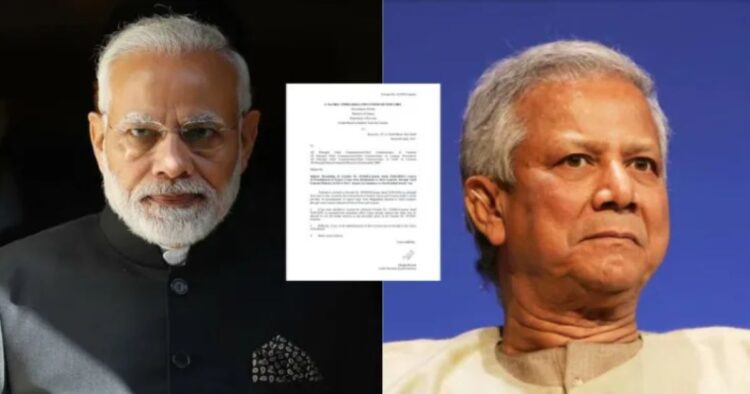KEY POINTS
- India ends transshipment facility for Bangladesh
- Facility had helped Bangladesh export via Indian ports since 2020
- Yunus called Bangladesh “guardian of the ocean” for India’s Northeast
India Stops Bangladesh’s Use of Its Ports for Export Cargo After Comments by Bangladesh Adviser
India has stopped a special facility that allowed Bangladesh to send export goods through Indian ports and airports to other countries. This decision could affect Bangladesh’s trade with several countries. The announcement was made by India’s Central Board of Indirect Taxes and Customs (CBIC) on Tuesday, April 8, 2025.
India’s Ministry of External Affairs (MEA) said that the facility had caused too much congestion at Indian ports and airports. This led to delays and higher costs for Indian exporters. So, India decided to cancel the facility. However, the change will not affect Bangladesh’s trade with Nepal and Bhutan that passes through India.

The Apparel Export Promotion Council (AEPC) in India supported the decision. Its secretary general, Mithileshwar Thakur, said Indian exporters had long been asking for this move. He said it will lower freight costs and reduce traffic at ports and airports. This decision comes shortly after Bangladesh’s Chief Adviser, Muhammad Yunus, visited China (March 26–29).
During the visit, he said Bangladesh is the “only guardian of the ocean” for India’s Northeast, which is a landlocked region. He also said this area could become an extension of the Chinese economy. Many in India saw Yunus’s comments as Bangladesh trying to gain leverage and bring China closer to a region that is sensitive for India.
This has made the relationship between India and Bangladesh more tense. In its official notice, the CBIC said it was canceling the earlier order that allowed Bangladeshi cargo to move through Indian land ports to Indian seaports or airports for export. There have been several incidences when Bangladesh have targeted India on different matters including religion, Hindu festivals and celebrations, education etc.
India Ends Special Trade Route for Bangladesh, Think Tank Says It’s Linked to China Ties
A group called the Global Trade Research Initiative (GTRI) explained that in 2020, India had allowed Bangladesh to send export goods to other countries by passing through Indian land borders and then using Indian ports or airports. This made it easier for Bangladesh to trade with the world.
But now, India has canceled that permission immediately. The official notice said that any cargo from Bangladesh that has already entered India under the old rules will still be allowed to continue its journey. Ajay Srivastava, a former trade officer and head of GTRI, said India has always supported Bangladesh. For the last 20 years, India has allowed Bangladeshi goods (except alcohol and cigarettes) to enter India without any tax.
However, Srivastava believes India took this step because Bangladesh is getting closer to China, especially in a sensitive region near India’s Siliguri Corridor (also called the Chicken’s Neck — a narrow area connecting mainland India to the Northeast). Bangladesh has reportedly invited China to help rebuild an old airbase in Lalmonirhat, near that area, which may have worried India.
Assam CM Criticizes Bangladesh Adviser’s Comments; Expert Raises WTO Concerns
Assam Chief Minister Himanta Biswa Sarma strongly criticized the comments made by Bangladesh’s Chief Adviser Muhammad Yunus. Sarma called the remarks “offensive” and said they highlighted a long-standing issue — the vulnerability of India’s narrow “Chicken Neck” corridor.
This corridor is a very small, 22-kilometer-wide strip of land in West Bengal that connects the rest of India to its Northeastern states. These states — Assam, Arunachal Pradesh, Manipur, Meghalaya, Mizoram, Nagaland, Tripura, and Sikkim — share long borders with Bangladesh, China, Myanmar, Bhutan, and Nepal. But they rely heavily on this narrow corridor to stay connected with the rest of India.
Earlier, Prime Minister Narendra Modi responded strongly and calmly to Muhammad Yunus, Bangladesh’s Chief Advisor, after Yunus made controversial remarks about India. Yunus had suggested that China could use Bangladesh to challenge India’s influence over its northeastern states.
PM Modi, in his response, said it’s important to avoid comments that could harm relationships between countries. He emphasized that India values its relationship with Bangladesh and wants to build a positive and peaceful connection with its neighbor. The Prime Minister also reminded Yunus that any rhetoric that disrupts the friendly atmosphere should be avoided.

















Comments